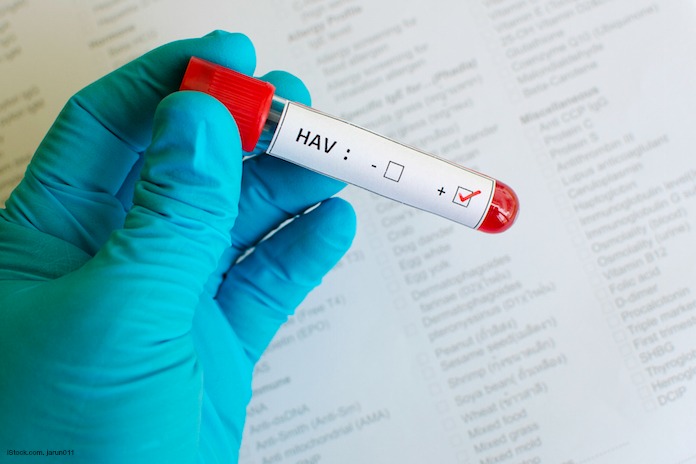The hepatitis A outbreak in Virginia that is linked to strawberries imported from Egypt and allegedly used in smoothies sold at Tropical Smoothie Cafe locations in that state is raising questions about how the virus is transmitted. The hepatitis A virus is very hardy and contagious. But how does it get on fruit?

In 2013, a large nationwide hepatitis A (HAV) outbreak sickened at least 165 people. Those illnesses were linked to Townsend Farms frozen berries that were sold at Costco stores. Traceback investigations found that pomegranates in that product, imported from Goknur, Turkey, were the source of the virus. The genotype of hepatitis A in that outbreak was very rare on the American continent, but common in the Middle East.
The food and drinks that are most likely to be contaminated with hepatitis A are fruits, vegetables, shellfish, ice, and water, according to the CDC. In the United States, chlorination of water kills the virus that enters the water supply. But other countries, especially those that are developing, don’t have the kind of infrastructure the U.S. does. Water that contains feces can carry the virus and it can contaminate produce via irrigation water, contaminated food handlers, pickers, and processors, or during processing.
Travelers to some third world countries, such as Thailand, are advised to get hepatitis A vaccinations before they leave for exactly this reason. The CDC recommends that vaccine because “you can get hepatitis A through contamianted food or water in Thailand, regardless of where you are eating or staying.”
And with the food supply now global, ingredients in many of the foods we buy at the grocery store and eat at restaurants may have been grown or processed in countries halfway around the world.
A paper in 2004 published in Clinical Infectious Diseases states that “HAV contamination of a food product can occur at any point during cultivation, harvesting, processing, distribution, or preparation.” Most reported foodborne hepatitis A outbreaks used to happen because infected food handlers at restaurants or social events prepared or served food to others.
But the outbreaks linked to Townsend Farms frozen berries, the outbreak in Hawaii linked to imported frozen scallops, and the outbreak in Virginia linked to imported strawberries may be changing that fact. The paper states that “physical characteristics of some produce items might facilitate transmission,” and washing reduces but does not eliminate detectable HAV.
The processing steps produce undergoes after harvesting may be especially problematic. The paper states that “removal of stems by workers in the field during picking might be a potential mechanism for strawberry contamination.” Green onions are “extensively handled,” in the field but are not further processed until they reach the consumer or a restaurant.
And shellfish can be contaminated with hepatitis A by inappropriate discard of sewage from fishing boats or oil platforms near shellfish beds, use of fecally contaminated water to immerse harvested live shellfish, or illegal shellfish harvesting near sources of sewage.
We don’t yet know how the strawberries and scallops were contaminated with the virus. And until there is an outbreak, it’s impossible to know if the produce or shellfish you are eating is contaminated.
You can take comfort in the fact that these outbreaks affect relatively few people. Even with the multiplier for hepatitis A cases (set in 2010) at 10.4, which means that in the Hawaiian outbreak there may be 2660 people sickened, and in the Virginia outbreak there may be 230 people sickened, these numbers are small when compared to the total populations that eat strawberries and scallops.
You can reduce your risk for hepatitis A infections by not eating raw shellfish. Always wash produce before you eat it, which reduces the numbers of any viruses or bacteria on those items. And stay informed. When there is an outbreak in your area, you should know about it and be prepared to see your doctor if you get sick.
If you are in a high risk group for complications of a hepatitis A infection, talk to your doctor about being vaccinated. The vaccine will protect you against this viral infection.




